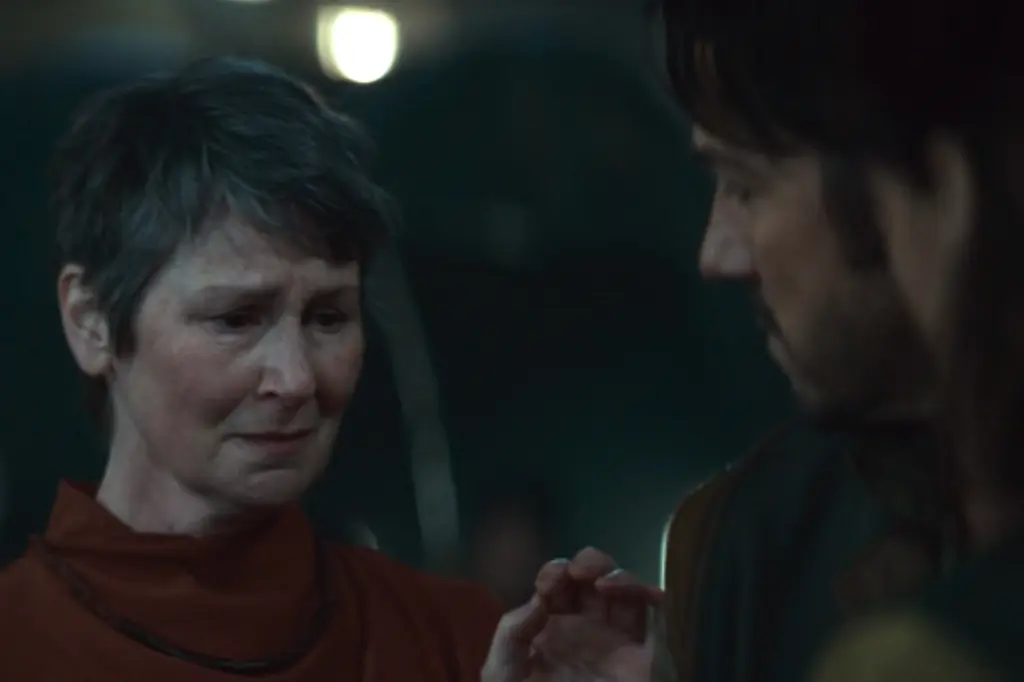Andor may be the most important Star Wars television ever made. This is not because the characters themselves were significant (though the were), or the plot was essential to the overarching narrative (though it was). The reason for Andor’s importance, rather, is that as a series, it finally defined the spirit of the people in the Star Wars universe.
Nemik’s manifesto speaks to this, with a call to action aimed at everyone, not just the mystical space knights/wizards/cleric multiclass who wield their magic and swords in a black and white partisan struggle. One might reasonable infer that this is a “secular” message, because the burden of building the rebellion falls on the hope and the sacrifice of “ordinary” people rather than demigods. As a friend of mine put it,
Andor has forced me (so to speak) to re-assess my relationship to the original trilogy. In short, I am no longer a fan of magic people. I prefer to see real people making it happen.
And the real people do make it happen! But Andor doesn’t distance itself from The Force – it doesn’t center it, but it does still reference it with the healer on Yavin who sees Andor and senses something about him that is very much not “normal” –
I sense the weight of things, things I can’t see. Pain, fear… need. Most beings carry the things that shaped them. They carry the past. But some… very few… your pilot… They’re gathering as they go. There’s a purpose to it. He’s a messenger.”
Andor has a destiny and there is a greater purpose – whether it pulls him or pushes him towards that destiny, is uncertain, but since we already know his fate, this is not just a throwaway line but an acknowledgement. Bix approaches this with the kind of reverence we associate with faith, not magic. Somewhat later, Bail Organa speaks the words for the time in the season (if not the series) – May the Force be with you – and it comes across as a prayer (du’a) rather than the militaristic slogan it takes on when X-Wing fighter pilots chant it as they prep for battle.
The Force as spirituality if not outright religion is presented in Rogue One with Chirrut Îmwe’s mantra of I am One with the Force and the Force is with me, with the naming of Jedi places throughout Rebels and Clone Wars as temples, and even the sneering comment by Admiral Motti in A New Hope that mixes metaphors with reference to “sorcerer’s ways” and “ancient religion.” This isn’t new, but what is new is the idea that ordinary people all over the galaxy are part of the Force too, in non-obvious ways. Andor has his share of luck, but that doesn’t make him a Jedi, he has no powers, and isn’t even Force-sensitive in the explicit way that Finn is shown to be The Last Jedi.
Andor isn’t some pawn of destiny, but is constantly making an active choice to go forward, and at various points even tries to turn away. It is Bix who forces his hand at the end, not fate. And yet, what is fate, but the aggregate sum of all our choices? It is that, but there is something more – the Force here is alive, it connects the players through their decisions, and looks over them in some way, as it seeks to restore balance.
Put more simply, maybe in the Star Wars universe, ordinary people have power, too. And that power might be something as simple as having some spiritual connection to each other that unites their aspirations and their resolve. Yin and yang – free will and destiny – each feeding the other, but ultimately there is something at work operating at a level beyond just individual actions.
And maybe that’s true for us in the real world, too. I certainly believe so. I have to. Rebellions are built on hope.
When we finally meet Luke Skywalker, we can better understand him. He crosses the threshold from being part of the Force to being One with the force. But it’s less a threshold than a continuum. Andor has shown us the vast reservoir from which Luke draws his power. This is what Yoda tells us from the beginning – Luminous beings are we, not this crude matter.
We aspire to be One with the Force. But the Force is with us. Always.
Related reading – Irfan Rydhan’s classic essay about Star Wars from an Islamic perspective. Also see showrunner Tony Gilroy’s comments on why he wanted the Force Healer scene.
